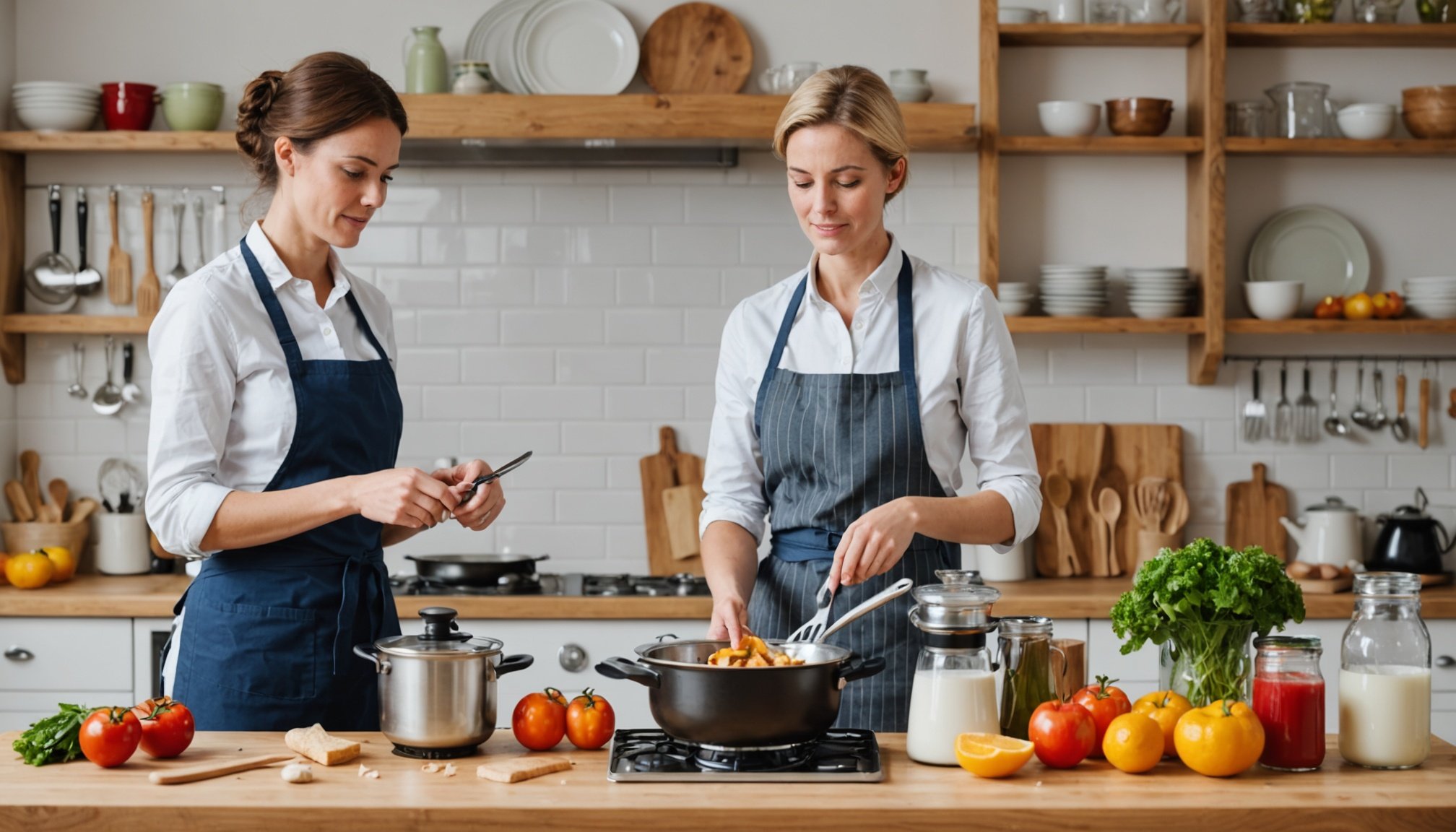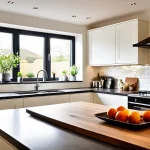Unveiling the Most Common Misconceptions About UK Kitchen Products
When it comes to equipping and maintaining your kitchen, it’s easy to get caught up in a web of myths and misconceptions. These misconceptions can lead to poor purchasing decisions, inefficient use of kitchen products, and even safety hazards. In this article, we’ll delve into the most common myths about UK kitchen products, providing you with the facts and practical advice to make informed choices.
The Myth of Non-Stick Cookware Being Indestructible
One of the most pervasive myths in the kitchen is that non-stick cookware is virtually indestructible. Many people believe that these pans can withstand high heat, metal utensils, and even the dishwasher without any damage.
In the same genre : How Can You Transform Your Cooking Routine with Innovative UK Kitchen Gadgets?
The Reality
Non-stick cookware, while incredibly convenient for cooking and cleaning, is not as durable as many think. Here are a few key points to consider:
- Heat Limitations: Non-stick pans should not be exposed to extremely high heat. Most non-stick coatings start to degrade at temperatures above 260°C (500°F), which can lead to the coating breaking down and potentially releasing harmful fumes.
- Utensil Care: Using metal utensils on non-stick pans can scratch the surface, compromising the non-stick coating. It’s best to use silicone, wooden, or plastic utensils.
- Dishwasher Safety: While some non-stick pans are dishwasher safe, it’s generally recommended to hand wash them to prevent damage from the high heat and harsh detergents.
Practical Advice
To extend the life of your non-stick cookware:
Topic to read : What Are the Must-Have Kitchen Gadgets of 2023?
- Avoid using metal utensils.
- Do not heat the pan to extreme temperatures.
- Hand wash your non-stick pans with mild soap and a soft sponge.
- Avoid stacking non-stick pans on top of each other, as this can cause scratches.
The Granite and Quartz Worktops Myth
Another common misconception is that granite and quartz worktops are virtually maintenance-free and non-porous.
The Reality
While both granite and quartz are popular choices for modern kitchens due to their durability and aesthetic appeal, they do require some maintenance.
-
Granite:
-
Granite is a natural stone that is porous, meaning it can absorb liquids and stains if not sealed properly.
-
It requires periodic sealing to maintain its appearance and protect it from stains.
-
Granite can be prone to etching (dulling of the surface) when exposed to acidic substances like citrus or vinegar.
-
Quartz:
-
Quartz worktops are engineered and non-porous, making them resistant to stains and easier to clean.
-
However, quartz can still be damaged by extreme heat, so it’s important to use trivets or mats under hot pans.
-
Quartz worktops can also be prone to scratches, although they are generally more durable than granite in this regard.
Comparative Table
| Feature | Granite | Quartz |
|---|---|---|
| Material | Natural Stone | Engineered Stone |
| Porous | Yes | No |
| Maintenance | Periodic Sealing | Easy Cleaning, No Sealing |
| Heat Resistance | Moderate | Moderate |
| Scratch Resistance | Moderate | High |
| Stain Resistance | Moderate | High |
The Cast Iron and Stainless Steel Myth
Many people believe that cast iron and stainless steel cookware are outdated and less efficient compared to modern non-stick options.
The Reality
Cast iron and stainless steel cookware have several advantages that make them highly valuable in modern kitchens:
-
Cast Iron:
-
Cast iron cookware is incredibly durable and can last for decades with proper care.
-
It retains heat exceptionally well, making it ideal for slow cooking and searing.
-
Cast iron can be seasoned to create a non-stick surface, although it requires more maintenance than modern non-stick pans.
-
Stainless Steel:
-
Stainless steel cookware is resistant to corrosion and can withstand high temperatures.
-
It is non-reactive, meaning it won’t transfer metallic flavors to your food.
-
Stainless steel cookware is easy to clean and maintain, and it can be used in the dishwasher.
Practical Advice
To make the most of cast iron and stainless steel cookware:
- Cast Iron: Season your cast iron pans regularly to maintain the non-stick surface. Avoid using soap or harsh chemicals when cleaning.
- Stainless Steel: Use a gentle cleanser and avoid abrasive scrubbers to prevent scratching the surface.
The Boiling Water Myth
A common myth is that boiling water is enough to sanitize utensils and cookware.
The Reality
Boiling water is indeed effective for killing many bacteria and viruses, but it may not be sufficient in all cases:
- Temperature: Boiling water reaches 100°C (212°F) at sea level, which is hot enough to kill most pathogens. However, some spores and certain types of bacteria may require higher temperatures or longer exposure times.
- Detergents: Simply boiling water may not remove grease or food residue, which can harbor bacteria. Using a mild detergent before boiling can help ensure cleanliness.
Practical Advice
For thorough sanitization:
- Use a combination of mild detergent and boiling water.
- Ensure that all surfaces are fully submerged in boiling water for at least 10 minutes.
- For tougher cleaning jobs, consider using a dishwasher or a sanitizing solution.
The Natural Stone and Modern Kitchens Myth
Some people believe that natural stone worktops are outdated and do not fit well in modern kitchens.
The Reality
Natural stone, such as granite and marble, can be a stunning addition to any kitchen, including modern ones:
- Aesthetic Appeal: Natural stone offers a unique, luxurious look that can enhance the aesthetic of any kitchen.
- Durability: With proper maintenance, natural stone worktops can last for many years.
- Versatility: Natural stone can be paired with a variety of kitchen styles, from traditional to contemporary.
Quote from a Designer
“Natural stone worktops bring a level of sophistication and elegance to any kitchen. When paired with modern fixtures and appliances, it creates a beautiful contrast that highlights the best of both worlds.” – Sarah Johnson, Interior Designer
The Time-Saving Myth of Modern Cookware
Many believe that modern cookware, especially non-stick pans, saves significant time in food preparation and cleaning.
The Reality
While modern cookware does offer some time-saving benefits, it’s not a magic solution:
- Non-Stick Pans: These pans are indeed easier to clean than traditional cookware, but they still require some maintenance to extend their lifespan.
- Other Modern Cookware: Stainless steel and cast iron cookware, though more durable, may require more time for cleaning and maintenance compared to non-stick options.
Practical Advice
To save time in the kitchen:
- Choose the right cookware for the job. Non-stick pans are great for quick meals, while stainless steel or cast iron might be better for more complex recipes.
- Clean as you go to avoid a big mess at the end of your cooking session.
- Invest in a dishwasher if possible, as it can significantly reduce cleaning time.
Misconceptions about kitchen products can lead to misunderstandings and poor decisions. By understanding the facts behind these myths, you can make informed choices that enhance your cooking experience and the overall functionality of your kitchen.
Here’s a detailed list of common misconceptions and the truths behind them:
-
Non-Stick Cookware:
-
Not indestructible; requires careful use and maintenance.
-
Avoid high heat, metal utensils, and dishwasher use.
-
Granite and Quartz Worktops:
-
Granite is porous and requires sealing; quartz is non-porous but can be damaged by heat.
-
Both need some level of maintenance.
-
Cast Iron and Stainless Steel Cookware:
-
Durable and efficient; cast iron requires seasoning, while stainless steel is easy to clean.
-
Both are valuable additions to modern kitchens.
-
Boiling Water:
-
Effective for sanitizing but may not remove all residue; use with detergent for best results.
-
Natural Stone in Modern Kitchens:
-
Can be a beautiful addition; offers durability and aesthetic appeal with proper maintenance.
By debunking these myths, you can create a kitchen that is not only functional but also a joy to work in. Whether you’re a seasoned chef or a beginner cook, understanding the realities of your kitchen products will help you make the most of your time and resources.




